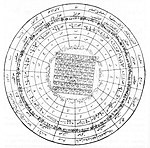This article is about the book by the Báb. For the 12th-century Arabic–Berber lexicon of the same name, see Ibn Tunart.
| Part of a series on |
| Bábí texts and scriptures |
|---|
 |
| The Báb's works |
| Compilations |
The Kitabu'l-Asmáʼ (Arabic: کتاب الأسماء; Book of Divine Names), also known as the Chahar Shaʻn (Persian: چهار شأن; The Four Grades) is a book written by the Báb, the founder of Bábi religion, in Arabic during his imprisonment in Máh-Kú and Chihriq in Iran (1847-1850). With a total volume of more than 3,000 pages, it is the largest revealed scripture in religious history. Stephen Lambden describes the Kitabu'l-Asmáʼ as "one of the most theologically weighty or important writings of the Bab".
At least twenty-six manuscripts exist, and much of the text has not yet been located. Some extracts are available in English in the volume Selections from the Writings of the Báb.
Contents
The text is divided in nineteen unities (Vahid) and 361 gates (Báb; chapters). and consists largely of "lengthy variations of invocations of the names of God'. Each name is discussed in four different parts, each part written in a different 'mode of revelation': divine verses, prayers, commentaries, and rational arguments. The 361 chapters symbolize "all things" (Kull-i-Shayʼ) and the days of the year of the Badi' calendar. Where the materials about the calendar are located in the Kitabu'l-Asmáʼ needs further research.
In The sources for early Bábí doctrine and history, the Kitabu'l-Asmáʼ is described as a work that could be of "much interest to the psychologist of religious inspiration". In a stream of consciousness style, the Báb explores many divine names and attributes and describes how humanity can be spiritualized by recognizing the Manifestation of God.
When recited aloud in the original Arabic, many passages have an "invocatory, rhythmic intensity".
Quotes
"Be lovingly watchful of one another and thus improve your affairs. Should ye find amongst you one who is afflicted with grief, remove his sorrow by any means in your power, and should ye find one stricken with poverty, enrich him to the extent of your ability. If ye find in your midst one who is abased, exalt him to the extent ye can, and if ye find one who is veiled by ignorance, educate him to the degree of your capacity. Should ye find amongst yourselves one who is single, help him to marry, in accordance with the divine law, to the limits of your ability, and should ye find one who is in distress, bring him tranquility by any means in your power. . . . Gaze upon others with the same eyes with which ye gaze upon your own selves. . . . If ye find in your midst one who is hungry, send him, in truth and to the extent of your power, food in such a way that his heart will not be saddened, and if ye find one who has no clothes, provide him with clothes in the most dignified manner, to the extent possible for you. Look then not at your selves and your possessions, but rather look at God, Who hath created you and conferred upon you from His kingdom that which is your lot." (29:423-24, Provisional translation by Nader Saiedi )
"Say: God verily cultivateth on earth, as He pleaseth, at His bidding. Will ye not behold? Think ye that ye are the sowers? Say: Glorified be God! We are, verily, the Cultivators. Say: Gaze then not upon any one save even as ye behold the most exalted of the renowned amongst you. Verily that which I attest with regard to both the rulers and the peasants amongst you, is the same thing: all have arisen at the bidding of God." (29:383-86, Provisional translation by Nader Saiedi )
Notes
- ^ Lambden, Stephen (2018). Kitab al-asma' - The Book of Names.
- ^ Smith, Peter (2000). "Names, Book of". A concise encyclopedia of the Baháʼí Faith. Oxford: Oneworld Publications. p. 258. ISBN 1-85168-184-1.
- ^ Saiedi 2008, pp. 36
- Lambden, Stephen. The Kitab al-asma'
- Denis MacEoin (1992). The Sources for Early Bābī Doctrine and History. Leiden: Brill. pp. 91–92. ISBN 90-04-09462-8.
- ^ Saiedi 2008, pp. 45
- Saiedi 2008, pp. 337
- Saiedi 2008, pp. 336
- MacEoin, Denis. The sources for early Bábí doctrine and history. E.J. Brill. p. 92.
- MacEoin, D.M. "BAHAISM xii. Bahai Literature". Encyclopaedia Iranica.
- Lambden, Stephen. "Chapter 4: From a Primal Point to an Archetypal Book". In Vahman, Fereydun (ed.). The Bab and the Babi Community of Iran. Simon and Schuster. p. 629.
- Saiedi 2008, pp. 323
- Saiedi 2008, pp. 81
References
- Saiedi, Nader (2008). Gate of the Heart. Waterloo, ON: Wilfrid Laurier University Press. ISBN 978-1-55458-035-4.
Further reading
- The Báb (1976). Selections from the Writings of the Báb. Wilmette, Illinois, USA: Baháʼí Publishing Trust. pp. 129–149. ISBN 1-931847-30-4.
External links
Online manuscripts (only a fraction of the size of the complete work):
- Kitabu'l-Asma' (2010; 481 pages)
- Kitab-i-Asma' (2005; 481 pages)
- INBA, Vol. 29 Tablets of the Bab - "The book of Names - Kitab-i-Asma" (336 pages)
- Kitab al-asma' I - The Book of Names or Chahar Shaʻn (The Book of the Four Grades), of Sayyid ʻAli Muhammad, the Bab (d. Tabriz 1850).
- The Kitab al-asma' II - Select Excerpts in Translation